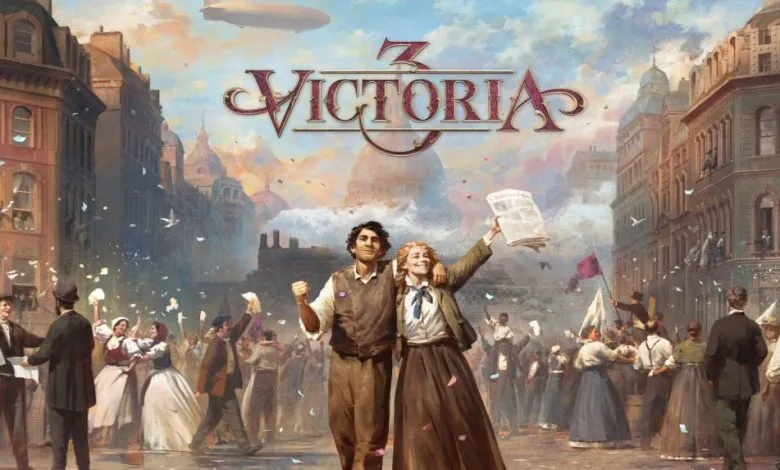
VICTORIA 3
Victoria 3 is a game that allows 1840s Greece to deal with the economic stagnation of the newly established state by establishing colonies in central Africa and exploiting its resources to create an economic superpower. The above is a fairly straightforward description of the possibilities and crazy historical prospects that Paradox Interactive's latest Grand Strategy game can offer, though it probably makes things look easier than they actually are. Unlike, for example, Stellaris, where the emphasis is on space exploration and "stellar LARPing", or Hearts of Iron IV where the focus is predictably on warfare, Victoria 3 clearly focuses more on the economic, socio-political and diplomatic realms. Which makes perfect sense, given that a typical Victoria session takes place between the years 1836 and 1936, years in which world-changing social developments took place that largely defined the world as we know it today.
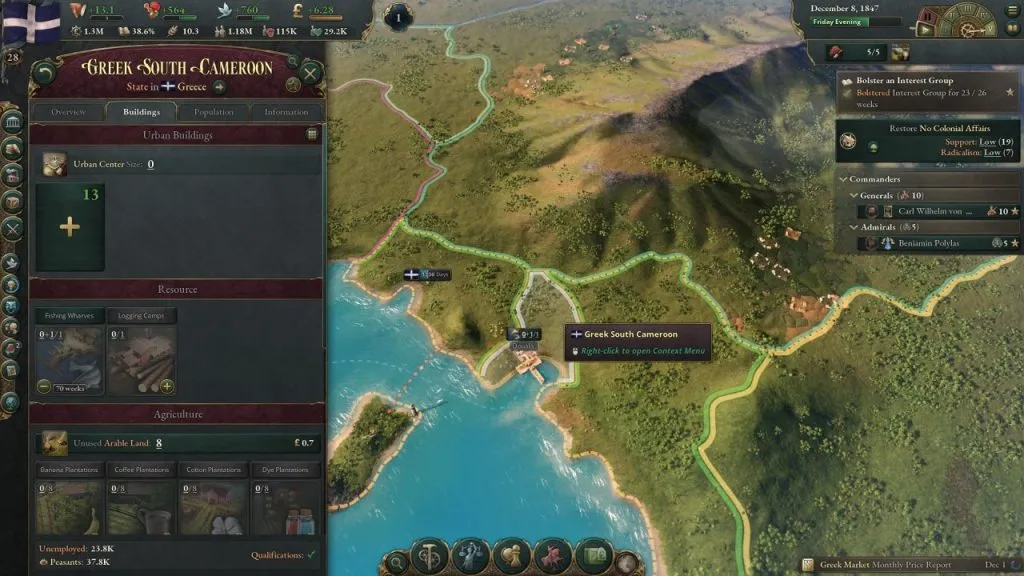
Gameplay-wise, Victoria 3 plays like a "typical" real-time-with-pause strategy game by Paradox. We control the fate of a country of our choosing from 1836 up to the eve of World War II, and are called upon to use all means at our disposal (economic, political, social, diplomatic, martial) to lead our country to prosperity, cultural brilliance, and perhaps even world domination.
The learning curve seems to be an issue of discussion in all Paradox games, and this applies to Victoria 3's case as well. The game is, predictably, a complex one - perhaps more complex than the developers' other strategy endeavours. And this is largely due to its very nature as an economic simulator in particular, as opposed to, say, Crusader Kings 3, where the emphasis is clearly more on the personal narrative of the player and their medieval dynasty.
An example of the game's complexity is something as simple and "grand strategy-y" as the salary of our country's citizens. In most grand strategy games out there, if such a customization even exists, it is usually defined by simply toying with a slider; choosing to pay a high wage means happiness for the citizens but reduced revenue for the state, and a low wage means the opposite. In Victoria 3, the wage of each social class is automatically determined as a result of a number of factors: the level of education/literacy/work qualification of the workers, the jobs on offer, the price of the goods they process at their workplace (which is influenced by many other local and global factors), the price of the goods their workplace produces, and the general economic health of the resource building that employs them.
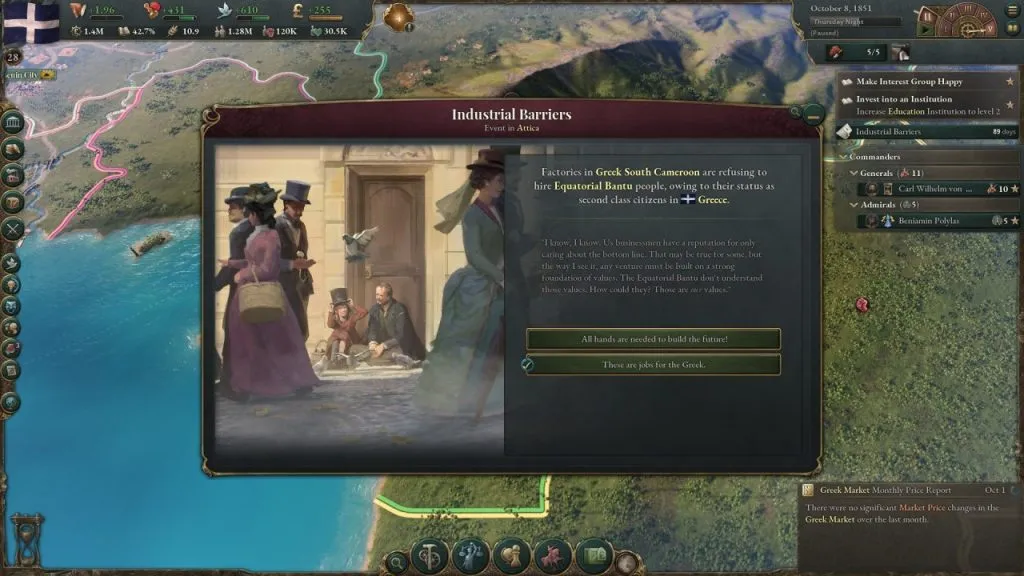
Therefore, if we want to increase wages, and by extension the per capita income of our state, all we have to do (pretty roughly and ignoring a thousand other things) is simply the following:
1) identify and build production buildings that will be economically competitive, both nationally and globally,
2) make sure our state has the workforce needed for these buildings to fully staff themselves,
3) keep the prices of raw materials for these buildings at a low level (either by producing the raw materials ourselves in other production units, or through commercial imports), always taking care that the above production/imports do not destroy the economic balances in other means of production of our state,
4) make sure that the building's products are sold at competitive prices, nationally and globally, again making sure that the prices are not SO high that the state cannot buy the products for use as raw material in other buildings,
5) in the long run, make sure that we expand these buildings to increase production, always making sure that they are financially robust enough to be able to hire the employees needed, but also making sure that the prosperity of this particular production unit does not result in other wealth-producing units being unable to hire the necessary staff because they offer lower wages than the profitable unit.
Does that sound slightly complicated? It is! At least, until you eventually get the hang of it. After that... it's still complicated, but you start to pretend you know what you're doing and things mostly work out.
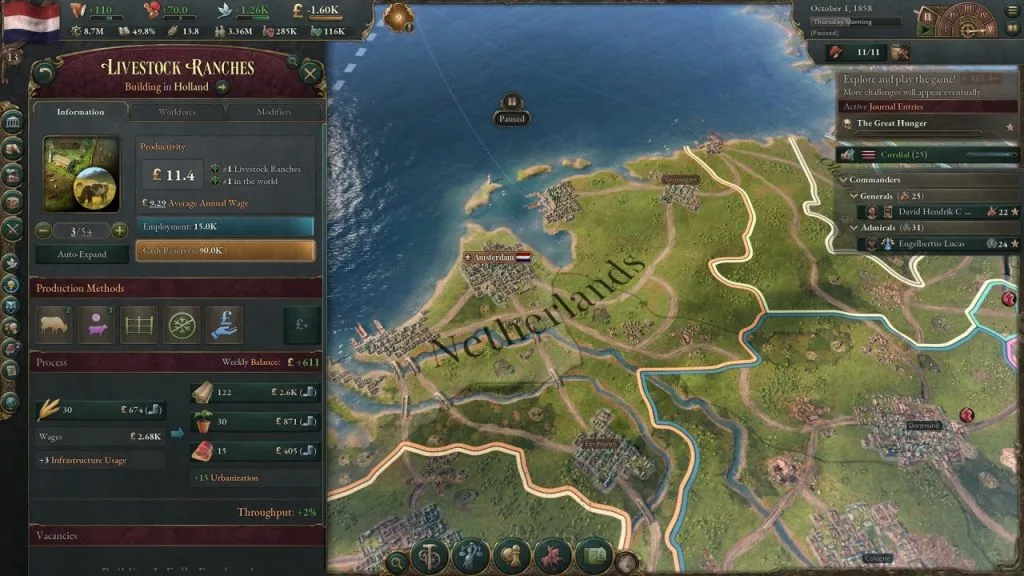
The sum of Victoria 3's mechanics is too extensive and complicated to be listed in a review, so it is recommended that the player learns them directly through the tutorials offered by the game. That's how I went about it myself, starting a game session as some "safe" country like Belgium, which I managed to gradually industrialize and make into a colonial superpower, before spicing things up a bit by turning the state into a socialist utopia and putting the means of production under the control of workers' councils. It should also be noted that, after presenting the basic mechanics of the game, the tutorials are quite open-ended, suggesting steps that can be taken to achieve an objective rather than offering a linear walkthrough like "press this button five times to earn a profit and continue the tutorial".
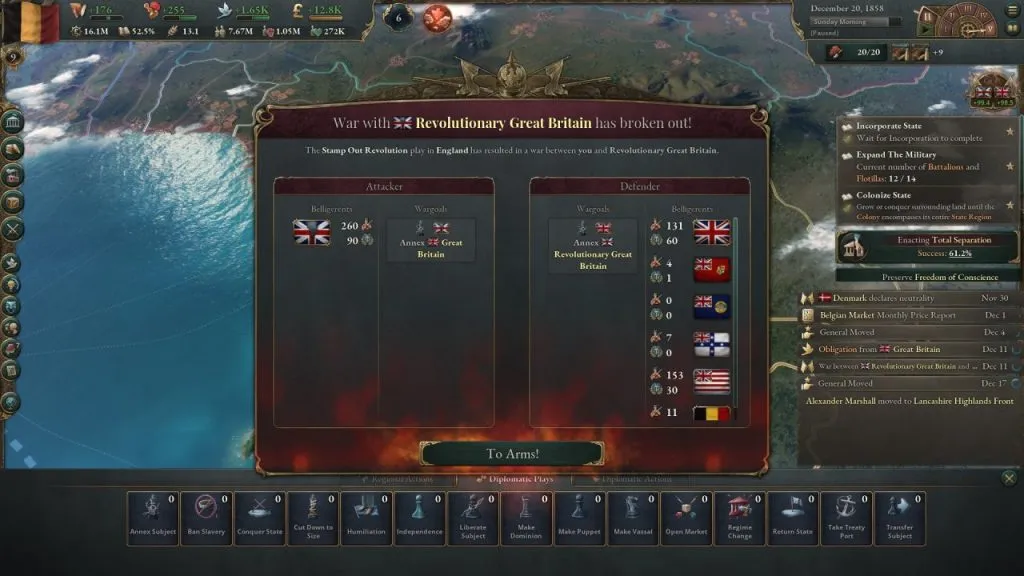
Feeling ready for a bigger challenge after spending some 15 hours in Belgium, I started a series of playthroughs as poor little Greece. In the first few of these I went down like the Hindenburg, bankrupting the already impoverished country with my clumsy handling. In another, an interesting development occurred: Egypt emerged as the arch-enemy of the Ottoman Empire, occupying Thessaly and threatening Constantinople itself. I took advantage of this situation by declaring war on Egypt with the aim of annexing Crete. And so, through a network of alliances similar to those that led to the outbreak of World War I, something rather unlikely happened: a world war in 1848, with Greece, Russia and the Ottoman Empire (!) as allies on one side, Egypt and Austria on the other, with the above powers fighting on three continents over Crete's annexation by Greece. Something which, oddly enough, was eventually achieved. After that, of course, Russia demanded Greece enter a customs union with them in exchange for the "favor" of having fought with us, which led to yet another economic crash for the country.
Eventually I learned how things work (mostly), and I stabilized the economy and resource production to the point where I could maintain and develop the aforementioned colonial possessions in Cameroon. With the rise of Nationalism (through researching the corresponding "technology" in the social tech tree), the Greek state annexed the Ionian Islands as a gift from England, and looked to our still enslaved brethren in occupied Thessaly, Macedonia and Asia Minor. Who knows what the future holds for tiny, colonial superpower Greece?
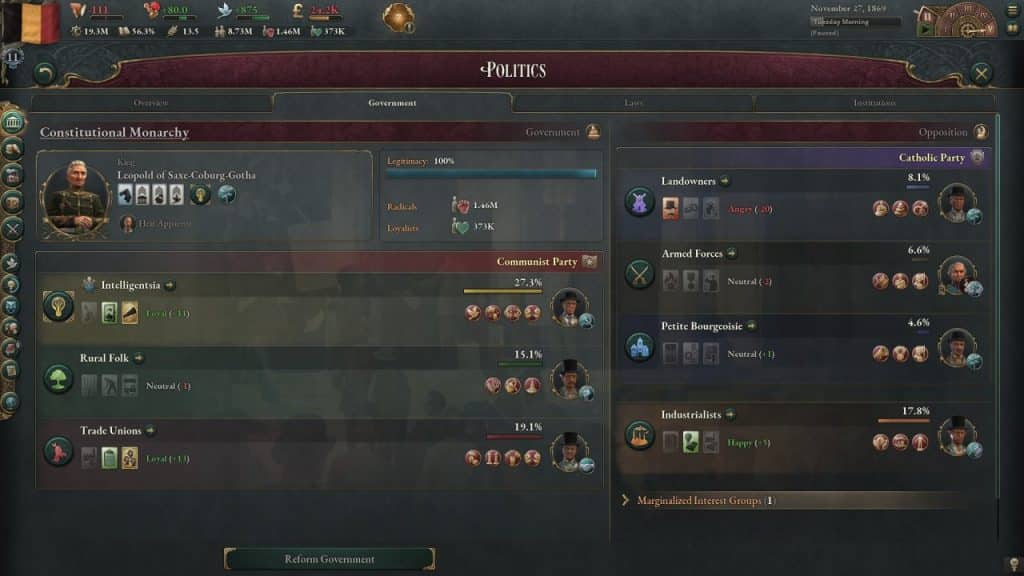
Much of the pleasure that Victoria 3 can offer lies in this unpredictable factor that each game session offers. This is, of course, in addition to the unimaginable pleasure of setting up a well-tuned economic machine that starts out as an insignificant provincial power and ends up influencing developments on a global scale.
Comparing Victoria 3 to the previous games in the series, the first change that is obviously noticeable is the clearly upgraded visuals, as the game shares the same upgraded version of the Clausewitz engine that we saw in Crusader Kings 3. As a result of this comes the other noticeable difference, the broader "optimization" we see in many aspects of the title. Some Victoria 2 fanatics may find that through these optimizations, Vicky 3 becomes easier, more "mainstream" and "noob-friendly", mainly due to the removal of some stats tables for our provinces, or the partial simplification of some mechanics (in this case, of course, "simplification" means that the player has to spend a few dozen hours learning a mechanic, instead of a hundred). This may be true to a certain extent, but certainly not to such an extent as to alter the special character of the series. With that last point in mind, it's anything but a negative development that more people will potentially be able to immerse themselves in the series.
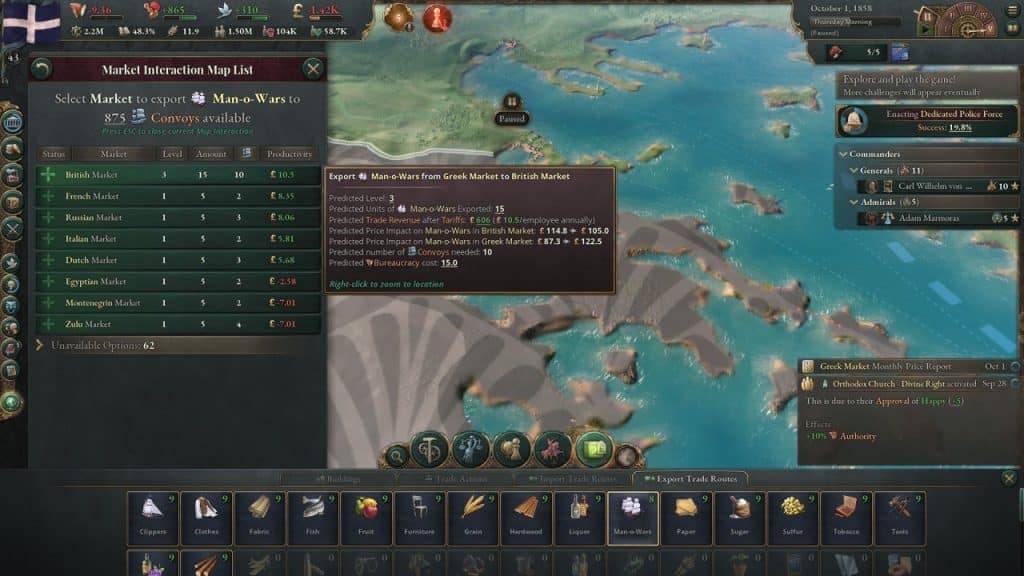
It is true that the game in its current phase has some elements that require balancing, both in terms of the AI's occasionally erratic behaviour (mainly regarding the way international relations play out, friendships, enmities, declarations of wars and alliances, etc.) and in the way the global market works (a player with a good knowledge of the market mechanics, for example, can exploit the supply and demand of goods in developed countries like Russia, and create an economic superpower even while playing as a literal shithole country three by five meters in the middle of the Pacific). But that's probably to be expected in the game's early, pre-release state, and it will certainly get smoothed out in the future. I'd also like some other Quality of Life additions, such as a more convenient and detailed menu summarizing our country's imports/exports and the gains or losses from them, as the way this information is currently displayed is quite clunky and dysfunctional.
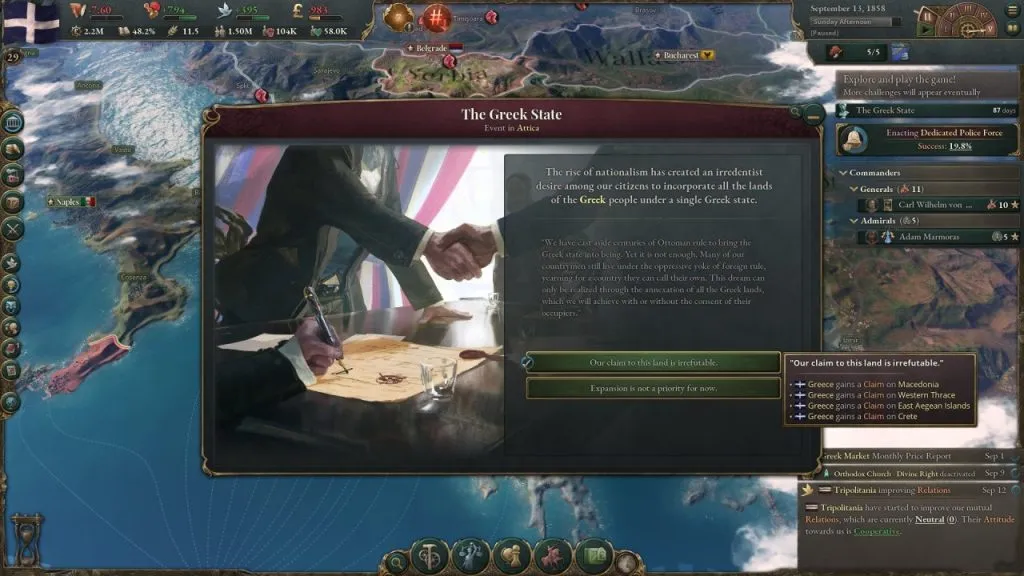
Ultimately, Victoria 3 succeeds brilliantly as an economic simulator set in a turbulent but certainly interesting period of humanity. A typical strategy game player might find it difficult to grasp the idea that the global price of cotton and timber could ever directly affect military might and world domination, but the game conveys exactly that point, and conveys it convincingly. Of course, despite its streamlined state compared to the previous entry in the series, there is still the eternal question that arises with all Grand Strategy games by Paradox: whether they will appeal to more "average" players who wish to immerse themselves in the geopolitical gameplay without having to perfect min/maxing economic indicators and production viability studies. Despite the helpful tutorial, I'm not sure this barrier can be fully overcome in Victoria 3. But anyone who takes the time to overcome it is certainly "in for a treat" as we say in my home country of Greek South Cameroon.
Greek GDP increase - 87%
87%
Regional Superpower
A deep and well-crafted economic simulator, not without flaws or room for improvement, but still immensely fun and faithful to the spirit that made the series great.

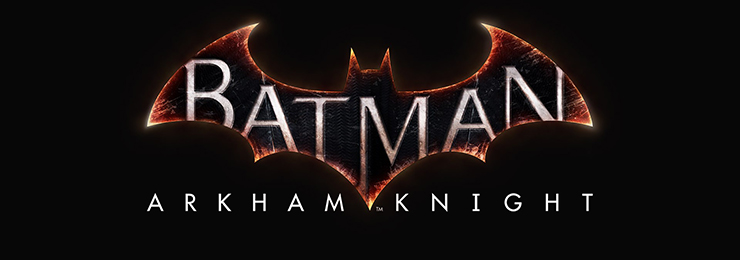




Ωραία παρουσίαση Ελλιόν, με κάνει να θέλω να παίξω το παιχνίδι παρόλο που ξέρω ότι δεν θα αντέξω ούτε τα 20 μπορατσολεπτά πριν πελαγώσω και παραδωθώ αμαχητί στο uninstall.
Ωραια παρουσιαση!
Ισως ειναι η σωστη συγκυρια να δοκιμασω και αυτη την ιστορικη παραντοξοπεριοδο, καθως δεν εχω ακουμπησει τα victoria 1-2.
Απολαυστικό review και κατατοπιστικό ως προς το τι στοχεύει κάθε παιχνίδι της Paradox πλέον. Έχοντας το Crusader Kings III από το Humble Choice το Victoria 3 ίσως μπει στο πολύ μεταγενέστερο backlog, αφού δεν ξέρω αν είμαι έτοιμος για ένα heavy euro-style finance simulator. 😀
Μπορεί και ναι.
Ναι το CΚ3 είναι πολύ μεγαλύτερο memeoπαίχνιδο, μπορείς να φτιάξεις χαρακτήρα σατανιστή κανίβαλο που κυριολεκτικά τρώει τους αντιπάλους του ενώ βλέπει στον ύπνο του έναν μονόκερο που του λέει τι να κάνει. Το Vic3 στοχεύει αλλού και διατηρεί μια σοβαρότητα.
Καθαρή απόλαυση το κείμενο, διάβαζα και γελούσα κάτω από τα μουστάκια μου.
Προφανώς δεν θα ‘παιζα τέτοια πράγματα ούτε να με πλήρωνες, αλλά ο τρόπος με τον οποίο αναδεικνύεται ο Ελληνοκαμερουνέζικος πατριωτισμός του Ελιόν σε συνδυασμό με την απαράμιλη, τέρμα αυτιστική κατανόηση και δεξιοτεχνία στο ‘παιχνίδι΄, μαγεύει.
Ωραίο κείμενο, αλλά θα αρκεστώ στην Πλατεία Βικτωρίας για την ώρα…